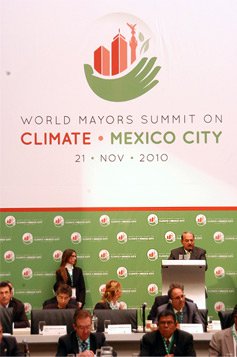
Carlos Slim participated as a special guest in the World Mayors Summit on Climate, on November 21st 2010, at the Palace of the School of Medicine in Mexico City.
At the Summit, mayors from around the world signed the Global Cities Covenant on Climate or “Mexico City Pact”. The document sends a message to the international community on the strategic importance of cities in the fight against climate change.
Martha Delgado Peralta, Vice President of ICLEI (Local Governments for Sustainability) and Mexico City’s Secretary for the Environment stated: Thank you very much. Good morning and welcome to Mexico City. We are glad to have you here and we thank you for attending this first World Mayors Summit on Climate 2010. We are convinced that mayors from around the world can be a key factor in the fight against global warming. World mayors have convened here today to demonstrate that it is possible to reach an agreement.
Statement by Mr. Carlos Slim during the World Mayors Summit on Climate, on November 21st, 2010.
Good morning, Mr. Marcelo Ebrard, Mayor of Mexico City, distinguished mayors, special guests and visitors attending this Summit in Mexico City, ladies and gentlemen. This World Mayors Summit on Climate is of the utmost importance, beyond any proposals or steps to be adopted in Cancun. Why? Because the greater part of human life and activities affecting climate change take place in cities. Because in addition to the proposals, agreements, pacts and decisions reached, cities will take actions to halt and revert the causes and consequences of climate change. And these actions will generate greater economic activity and plenty of new jobs.
This type of investment will be one of the best options for public expenditure as well as for public and private associations, civil society organizations and foundations. Above all, it will be an unprecedented opportunity to take advantage of low interest long-term funding derived from the great financial and economic crises affecting industrialized countries, which will have to implement very assertive monetary policies. Of course, these investments will contribute to overcome the crisis.
I would like to highlight some of the necessary actions to combat climate change. The first one regards water, sewerage, water conveyance, disaster prevention and their optimal management. Water is a vital, renewable and recyclable resource. Its shortage, quality and cost, as well as the disasters produced by water, are all consequence of deficient and insufficient investments and inadequate management.
We need to implement good quality potable water networks, enable cross subsidies that benefit low-level consumers, allow for diverse types of water treatments, including advanced third level treatments, foster recycling, regulating dams, infiltration areas, zonal rain drainage systems and desalinization. With these measures water will cease to be a critical and scarce resource.A second important point is reforestation. Reforestation should be more profitable for communities than deforestation. This is an important element to reduce undesirable emissions. Along with reforestation one should implement concrete programs at global level to prevent fires. These programs should be operated at local level. Combatting fires is very important.
Another element is the greening of cities. We know that nature, plants and trees are responsible for the absorption of carbon dioxide; they produce oxygen and, indeed, contribute to the conservation of biodiversity.
A third important element regards waste. Waste should be transformed from an environmental liability into an environmental asset. Once huge wastelands reach their maximum capacities they should be converted into gardens. They could even generate energy and be financially sustainable or even profitable through the recycling of land for diverse purposes. Recovered lands could be an important source of financing.
This has already being done in Mexico City, in very big areas as the Bordo Oriente (the Eastern limit) and perhaps soon in the Bordo Poniente (the Western limit).
Another important topic is energy. Universal access to energy and to all public services is still pending. Cultural change in this area is fundamental, particularly regarding consumption and refuse. One should focus on the efficiency and efficacy of energy management and, of course, on the development of renewable and clean energies.
Another important element is transports and communications. These should be restructured and modernized. One should develop public collective transportation that reduces the use of automobiles as well as other means of transportation that cover shorter distances faster, with less slow downs and less accelerations and at a higher average speed. Of course, there should be fiscal and other types of incentives to stimulate the use of non-polluting vehicles.
Lastly, I believe that the one element that will transform and renew the way our societies function is technology.
With technology, and in particular telecommunications and the diverse applications of a digital society, one can reduce emissions in a considerable manner. The digital revolution will be an important factor to achieve this end.
Digitalization is essential for this purpose. Through digital culture, digital education and the incursion of government services into the digital field, citizens will no longer need to travel to governmental offices; everything will be treated from distance.
As I mentioned, we should promote digital distance learning and distance health care. We have already witnessed during the past years several experiences in distance health care, where there is no need for transportation.
Important topics include videoconferences, telepresence, electronic commerce, e-finance and banking services, sports as entertainment, culture, and of course, information and knowledge.
Nowadays, cities face new kinds of problems like insecurity. Information technologies and knowledge will be key factors to reduce insecurity in our cities.
After having detailed some of the important elements that I consider essential in the fight against global warming, I can only congratulate you very warmly for this Summit. I hope that the Mexico City Pact will entail concrete actions and public policies and that it will be an example for cities from around the world.
Thank you.
